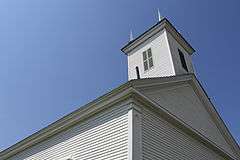Troy Meeting House
|
Troy Meeting House | |
 | |
  | |
| Location | 514 Bangor Rd., Troy, Maine |
|---|---|
| Coordinates | 44°39′54″N 69°14′23″W / 44.66500°N 69.23972°WCoordinates: 44°39′54″N 69°14′23″W / 44.66500°N 69.23972°W |
| Area | 0.23 acres (0.093 ha) |
| Built | 1840 |
| Architectural style | Greek Revival, Gothic Revival |
| NRHP Reference # | 11000818[1] |
| Added to NRHP | November 18, 2011 |
The Troy Meeting House, also known as the Troy Union Church, is a historic church at 514 Bangor Road (Maine State Route 9) in Troy, Maine. Built in 1840, it is a fine example of transitional vernacular Greek Revival-Gothic Revival architecture, and an enduring symbol of the religious life of the community. It was listed on the National Register of Historic Places in 2011.[1]
Description and history
The Troy Meeting House is located in a small crossroads hamlet known as Troy Corner, formed by the junction of Bangor Road (the major east-west route through Troy) and Ward Hill and Bagley Hill Roads. It is set a short way east of this junction, on the south side of Bangor Road, in a small open lot now surrounded by forest. It is a modest single-story wood frame structure, with a gabled roof, clapboard siding, and a granite foundation. It has a timber frame built out of hand-hewn members, and was built using traditional scribe-rule methods. The building corners have pilasters with lancet-arched paneling, which rise to a simple entablature. The front facade is symmetrical, with a pair of entrances flanking a central sash window. The entrances are topped by lancet-arched trim and flanked by paneled pilasters similar to those on the building corners. A single-stage square tower rises above, with rectangular louvered openings and a pinnacles at the corners above.[2]
The church was built in 1840 as a non-denominational "union" church, available for use by any local denomination. It was probably built by members of the Troy Meeting House Society, and has served the community as a religious meeting place since then, except for a seven-year period of closure during World War II. It is the community's oldest church, and its only 19th-century church building still in ecclesiastical use.[2]
See also
References
- 1 2 National Park Service (2009-03-13). "National Register Information System". National Register of Historic Places. National Park Service.
- 1 2 Mitchell, Christi (2011). NRHP nomination for Troy Meeting House; available by request from the Maine Historic Preservation Commission